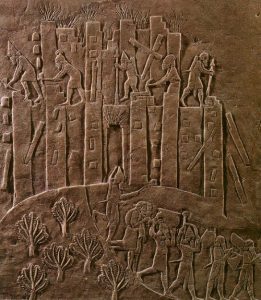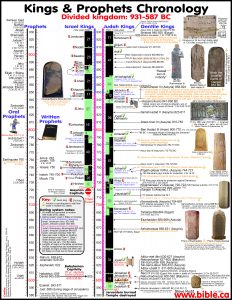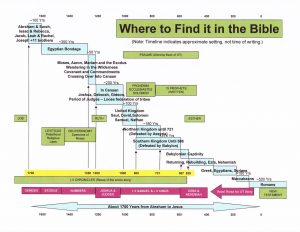
Shownotes
Wisdom-Trek / Creating a Legacy
Welcome to Day 1321 of our Wisdom-Trek, and thank you for joining me.
I am Guthrie Chamberlain, Your Guide to Wisdom
Mastering the Bible – Excavations and Timelines – Worldview Wednesday
Wisdom - the final frontier to true knowledge. Welcome to Wisdom-Trek where our mission is to create a legacy of wisdom, to seek out discernment and insights, and to boldly grow where few have chosen to grow before.
Hello, my friend, I am Guthrie Chamberlain, your captain on our journey to increase wisdom and create a living legacy. Thank you for joining us today as we explore wisdom on our 2nd millennium of podcasts. This is Day 1321 of our trek, and it is Worldview Wednesday. Creating a Biblical Worldview is important to have a proper perspective on today’s current events.
To establish a Biblical Worldview, you must also have a proper understanding of God and His Word. Our focus for the next several months on Worldview Wednesday is Mastering the Bible, through a series of brief insights. These insights are extracted from a book of the same title from one of today’s most prominent Hebrew Scholars, Dr. Micheal S. Heiser. This book is a collection of insights designed to help you understand the Bible better. When we let the Bible be what it is, we can understand it as the original readers did, and as its writers intended. Each week we will explore two insights.
Mastering The Bible – Excavations and Timelines
Insight Thirty-Seven: Most of the Cities and Towns Mentioned in the Bible Have Not Been Excavated
If you asked someone where the events of the Bible took place, chances are you’d get an answer like “Israel” or “the Holy Land.” That's, of course, true, but the statement is imprecise and, to a significant extent, quite incomplete.
There are hundreds of sites mentioned in the Bible that are connected to events in the biblical saga. Some are the setting for just one event, while others are crucial focus points for many episodes in the history of Israel or the work of Jesus and the apostles.
Only a small percentage of the places mentioned in the Bible have been excavated by archaeologists. Archaeology regularly yields information that illumines the biblical world and the stories we read in Scripture. The fact that many sites in Israel have not yet been excavated, or even discovered, is important for Bible students in several respects.
First, the circumstances of biblical events are often framed by their location. Biblical places often have a long history (positive or negative), and that history creates the backdrop for why a biblical writer may have included it in the story. By way of a more modern example, Robert E. Lee’s refusal to accept President Lincoln’s offer of command over the Army of the Potomac is comprehensible when we learn Lee was from Virginia.
Lee was no apologist for slavery. Given the proximity the army offered to him to his home state, Lee could not bear the thought of invading his home state and killing fellow Virginians. Lee’s personal attachment to the geography of the situation prompted his decision. In terms of the Bible, when sites cannot be located or go unexcavated, some details of Bible interpretation remain unclear. Archaeology becomes a hermeneutical aid.

Second, excavation of sites often helps clear up a Bible difficulty or perceived error in the biblical text. The history of biblical scholarship has numerous examples of how archaeology clears up an apparent dilemma or lends credibility to biblical details. For example, an inscription discovered at the Tel Dan discovered in 1993 contains what most scholars regard as a verifiable reference to the “house of David.” Seals (small pieces of pressed clay) bearing the names of biblical kings serve to validate their existence.
Archaeological work in Israel is a work in progress. When hostile critics attack the Bible on the flawed presumption that all the data that could illuminate the discussion has been discovered, their conclusion assumes too much.
Insight Thirty-Eight: The Books of Joshua through 2 Kings Were Likely Written by the Same Person(s) at the Same Time

The first Old Testament book after the Torah, the book of Joshua, describes the conquest of the land of Canaan by the Israelites. Joshua marks the transition of the people of Israel to a settled nation. The books that follow it, Judges, chronicle the nation’s failure to drive out all the foreign inhabitants of the land along with its consequences. It includes many stories and the saga of one family during the period of the judges Naomi and Ruth. After that, it wraps up the end of the rule of local judges in favor of a monarchy of kings, particularly David in 1st & 2nd Samuel, and the sad story of how the monarchy fell into ruin after the end of the reign of Solomon, David’s son in 1st & 2nd Kings. Collectively, those books take up a lot of space in the Old Testament and a lot of the biblical story.
It may surprise you to learn that all of these books are anonymous. None of them name or even hint at an author. They do present a theologically unified picture of the cost of losing faith in God and living in disobedience to him. The books from Joshua to 2 Kings proclaim in one voice that the ultimate disastrous judgment of God on Israel, which was the exile due to the sins of the Israelites, especially the matter of idolatry. Each book builds the case in painstaking detail that the awful judgment of the exile was entirely justified. Anyone living during the dark days of the breakdown of the nation, or afterward, would only need to read Joshua through 2 Kings to know that Israel got what it deserved.
This chorus of warning and condemnation is the main reason why many scholars believe these books were written by the same person or persons and, therefore, at the same time. Because the condemnation of idolatry is so strong and presented as fact in much of this material, scholars propose that the material was written sometime shortly after the northern kingdom of Israel, ten of the tribes, was taken into captivity by the Assyrians. How could this happen? Where was God? Joshua through 2 Kings, answered those questions. God was there all the time, but Israel had turned her back on him. Consequently, God used the Assyrians to judge them.
At the same time, this terrible message was intended to save the remaining two tribes from the same fate. The people of Judah, the southern kingdom, could learn from the epic horror to stay loyal to God and his law, trusting him to protect them. Sadly, the southern kingdom faltered. God raised up prophets to direct the people back to himself, often by reminding them of what had happened to their relatives. But in the end, the last two tribes would suffer a similar end, this time at the hand of Babylon. But God anticipated the failure and vowed to keep a remnant of faithful believers alive—and send a future deliverer.
We need to read these books as the hindsight warnings they were. They provide us with valuable lessons about the human heart, the cost of sin, and God's mercy. They needed, as we do, to follow God’s exhortation to Joshua when he took over the leadership of the nation of Israel.
“Be strong and courageous, for you are the one who will lead these people to possess all the land I swore to their ancestors I would give them. Be strong and very courageous. Be careful to obey all the instructions Moses gave you. Do not deviate from them, turning either to the right or to the left. Then you will be successful in everything you do. Study this Book of Instruction continually. Meditate on it day and night so you will be sure to obey everything written in it. Only then will you prosper and succeed in all you do. This is my command—be strong and courageous! Do not be afraid or discouraged. For the Lord your God is with you wherever you go.”
That will conclude this week’s lesson on another two insights from Dr. Heiser’s book Mastering the Bible. Next Worldview Wednesday, we will continue with two additional insights. I believe you will find each Worldview Wednesday an interesting topic to consider as we build our Biblical worldview.
Tomorrow we will continue with our 3-minute humor nugget that will provide you with a bit of cheer and help you to lighten up and live a rich and satisfying life. So encourage your friends and family to join us and then come along with us tomorrow for another day of our Wisdom-Trek, Creating a Legacy.

If you would like to listen to any of our past 1320 treks or read the Wisdom Journal, they are available at Wisdom-Trek.com. I encourage you to subscribe to Wisdom-Trek on your favorite podcast player so that each day’s trek will be downloaded automatically.
Thank you so much for allowing me to be your guide, mentor, and, most of all, your friend as I serve you through the Wisdom-Trek podcast and journal.
As we take this trek together, let us always:
- Live Abundantly (Fully)
- Love Unconditionally
- Listen Intentionally
- Learn Continuously
- Lend to others Generously
- Lead with Integrity
- Leave a Living Legacy Each Day
I am Guthrie Chamberlain reminding you to Keep Moving Forward, Enjoy Your Journey, and Create a Great Day Everyday! See you tomorrow!